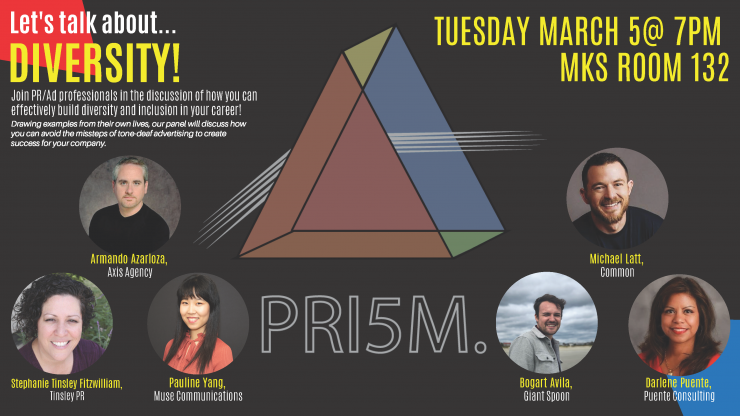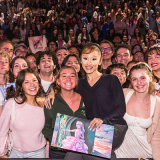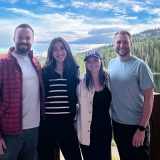Diversify Your Feed Communications Professionals Share the Importance of Diversity and Inclusion
March 11, 2019
Asked to advise a room full of Chapman students about how to identify a workplace where diversity and inclusion are valued, Bogart Avila, BA/PRA ’15, a strategist for Giant Spoon, Adweek’s Breakthrough Agency of the Year for 2018, had a straightforward answer: “Ask questions about the organization’s diversity initiative. If they can’t give you tangible next steps for diversity, then they haven’t thought about it.”
How do we create a more diverse workplace? How does someone’s identity impact their career? Why is it so hard to talk about? Five communications professionals, including four Chapman PR and Advertising alumni, discussed these questions with Chapman students as part of the Pri5m Bateman Team and PRAA’s diversity panel on Tuesday, March 5, in Marion Knott Studios.
The panel explored ideas ranging from what questions students should ask when interviewing to what a world of true inclusion would look like. They also spoke about broader topics such as how consumers can support companies that embrace diversity.

Stephanie Tinsley Fitzwilliam, class of ’00, founder of Tinsley PR, a leading firm in gaming, said, “Everybody’s playing games. The fans are speaking with their dollars.” Where people spend their money speaks directly to an organization. When consumers stop spending their money for a product or service, companies take notice. But, of course, diversity and inclusion are not just about the money.
Pauline Yang, class of ’16, account executive at Muse Communications, a multicultural agency, said that “everyone brings a new perspective.” As the panelists explained, diversity and inclusion provide more voices and experiences to draw from. These perspectives keep companies from creating offensive ads like the Kendall Jenner Pepsi ad or products like H&M’s “Coolest Monkey in the Jungle” sweatshirt. Having diverse perspectives in the communications field leads to a environment of understanding and respect.
Reaching a point of understanding requires lots of time and effort according to Darlene Puente, a marketing consultant at Puente Counseling. “[People need] to sacrifice hours, or nights, that’s what it takes to understand a new demographic.” Puente said, “Advice for new students: it’s hard work.”
And the work of enriching diversity includes everyone, from every background, says Michael Latt, ’13, a producer and strategist who has worked for clients like Common and the Sundance Institute. As a white male, Latt uses “my [his] privilege to amplify other voices. I want to put my [He puts his] foot in the door so I [he] can open it for others.”
Latt offered this perspective on how he sees his role in building diversity: “When you talk about white dudes in board rooms it’s not about me, I know my intentions. You should not frame it as the white savior. It’s about standing on the sidelines, not making the narrative about you. Come with an open mind and people will see what you are about. Come with humility.”
The Panelists
Two of the panelists came from multicultural agencies, others came from a background of supporting diversity and inclusion through their work in hiring, and all of them came to share what makes diversity so important to them and in our world today. Each shared moments from his or her own personal journey and talked about how their identity has impacted their work.
The panelists were:
- Bogart Avila ’15, a strategist at Giant Spoon, Adweek’s Breakthrough Agency of the Year in 2018. He leads internal culture programs and college outreach initiatives. He has worked on brands including Starbucks and NBCUniversal.
- Pauline Yang ’16, an Account Executive at Muse Communications, a multicultural advertising agency. Specializing in the Asian/Asian American market, she was brought on to help expand the Asian business for the Wells Fargo account, as well as to support the existing African-American work.
- Stephanie Tinsley Fitzwilliam ’00, founder of Tinsley PR, a leading firm in gaming. Tinsley helped launch the Microsoft Xbox 360 and currently sits on the GLAAD Advisory Council for its games initiatives.
- Michael Latt ’13, a political advisor and communications director for award-winning artist Common. He has worked on projects including If Beale Street Could Talk and Crazy Rich Asians.
- Darlene Puente, a multicultural marketing consultant at Puente Counseling, who has previously worked with clients like Time Warner Cable


